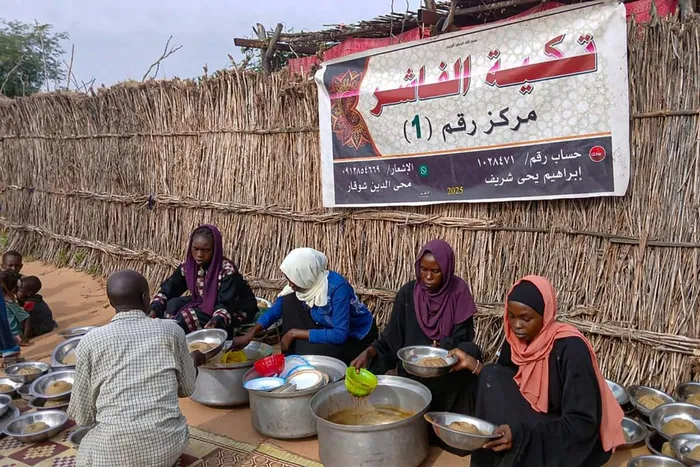Sudan's Political Crisis Deepens as RSF Forms Parallel State

Sudanese volunteers prepare free meals for some of residents of Al Fasher, a city besieged by Sudan's paramilitary Rapid Support Forces (RSF) for more than a year, in Darfur region, on August 11, 2025.
Image: AFP
Nicholas Mwangi
The commander of Sudan’s paramilitary Rapid Support Forces (RSF), Mohamed Hamdan Dagalo, widely known as Hemedti, was sworn in last week to lead a self-declared parallel government in Sudan, deepening the country’s political crisis.
Sudan has been engulfed in a civil war between the RSF and Sudanese Armed Forces since May 2023, which has seen millions of people displaced and tens of thousands killed. A historic hot spot in Sudan, Darfur, is experiencing intensified violence, as an end to the conflict seems more and more out of reach.
Hemedti took the oath before Chief Justice Ramadan Ibrahim Shamila in Nyala, the capital of South Darfur. The ceremony marks the latest escalation in the RSF’s bid to formalize authority in parts of Sudan, amid widespread accusations of atrocities committed under its command.
The leader of the Sudan People’s Liberation Movement–North (SPLM-N), Abdel Aziz al-Hilu, was sworn in as deputy head of the council, and thirteen council members were sworn in. They include eight new regional governors: Al-Hadi Idris (Darfur), Jagoud Makwar (South Kordofan), Joseph Tuka (New Funj), Mohamed Mohamed Hamed (Kordofan), Salih Issa (Central region), Mabrouk Mubarak Salim (Eastern region), Abu al-Qasim al-Rasheed (Northern region), and Faris al-Nour (Khartoum).
The swearing-in follows the controversial establishment of a parallel Sudanese government in Nairobi earlier this year. The move triggered a diplomatic fallout between Sudan and Kenya. On February 20, Khartoum recalled its ambassador from Nairobi, accusing Kenya of violating international law, the UN Charter, and the African Union’s Constitutive Act. Sudan’s Ministry of Foreign Affairs argued that hosting and engaging with an armed faction accused of war crimes undermined Kenya’s diplomatic obligations. In retaliation, Sudan suspended imports from Kenya.
Escalating violence in Darfur
While Hemedti attempts to consolidate his political claim, the humanitarian situation in Darfur continues to spiral. Over the past few weeks, the RSF has intensified assaults in North Darfur, particularly in the capital, El Fasher. Ground battles and heavy shelling in residential neighborhoods have killed hundreds of civilians and forced thousands to flee.
On August 29, according to the International Organization for Migration (IOM), approximately 1,050 families were newly displaced from El Fasher due to deteriorating security. Just days earlier, RSF shelling killed at least seven people and injured 71 others.
The Guardian reported that in April, more than 1,500 civilians may have been massacred in Sudan’s largest Internally Displaced Persons (IDP) camp, a crime that could amount to one of the gravest war crimes since the conflict erupted.
Civilians trapped and exposed
The United Nations estimates that around 260,000 civilians, including 130,000 children, remain trapped in the El Fasher camp for internally displaced people. For more than 16 months, they have endured desperate conditions without humanitarian assistance due to an RSF-imposed siege.
The toll has been devastating; over 1,100 grave violations have been verified in El Fasher alone, including the killing and maiming of over 1,000 children. At least 23 children have been subjected to rape, gang rape, or sexual abuse, while others have been abducted, recruited, or used by armed groups, UNICEF reported.
Further, the humanitarian crisis is being compounded by Sudan’s worst cholera outbreak in decades. Since July 2024, more than 2,400 deaths have been recorded nationwide.
Oilfields under attack
The RSF has also expanded attacks beyond Darfur.
On August 30, Sudan’s Ministry of Energy and Petroleum confirmed renewed RSF attacks on the Heglig oil facilities in South Kordofan state. According to the ministry, RSF fighters struck the Heglig Operations Basecamp at around 2:30 am, destroying the airport terminal and causing panic among staff at the processing and pumping stations. Shrapnel from the attack reached the export basecamp, forcing Sudan to activate an Emergency Shutdown Plan.
The ministry warned that continued RSF assaults could render the facilities “inoperable in the long run” and confirmed that personnel have been evacuated, reducing operations to a bare minimum. As a result, the state oil company PETCO is expected to miss export targets for the month.
Heglig, one of Sudan’s most vital oil hubs, has already been under strain since operations were disrupted in April 2023. The government described the latest RSF strikes as an “unprovoked attack on civilian infrastructure” that poses a grave threat to the stability of crude oil flows to South Sudan.
A question of legitimacy
The RSF’s attempt to present itself as a governing authority raises questions of legitimacy both domestically and internationally. With the African Union having condemned RSF’s actions and no international recognition of the RSF parallel government, the Hemedti swearing ceremony and his “mandate” lack legitimacy.
* This article was originally published at https://peoplesdispatch.org/
** The views expressed do not necessarily reflect the views of IOL, Independent Media or The African.